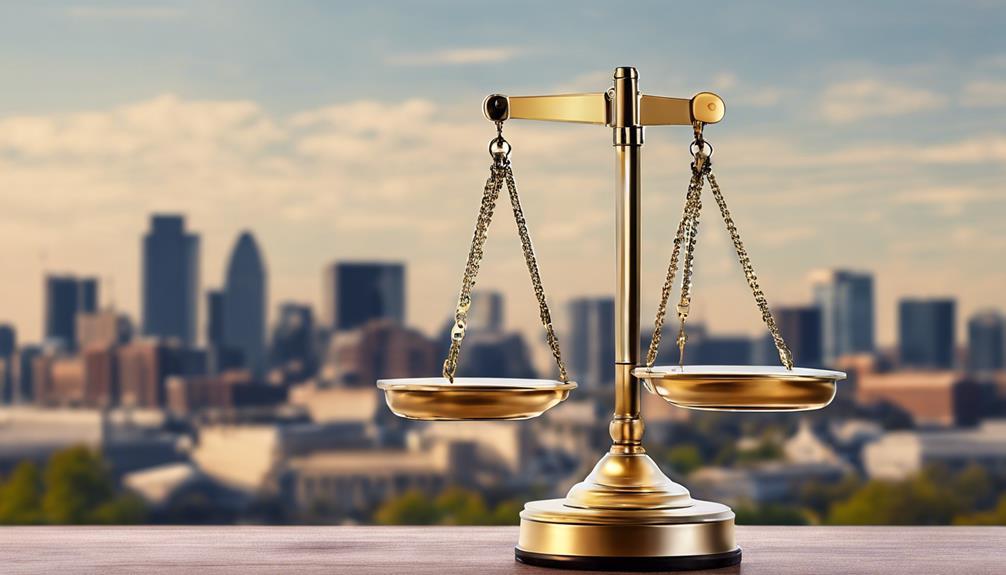When you're searching for legal representation in Overland Park, KS, understanding attorney ratings can be essential to your decision-making process. These ratings often reflect a blend of client feedback, professional experience, and peer evaluations, giving you a clearer picture of an attorney's capabilities. However, navigating through various rating systems and platforms can be challenging. What should you know about the factors that influence these ratings, and how can they guide you in selecting the right attorney for your needs? Exploring these aspects could reveal more than you initially expect.
Importance of Attorney Ratings

When searching for legal representation, understanding attorney ratings can significantly impact your decision. These ratings provide insights into an attorney's reputation, experience, and client satisfaction, which are crucial factors in determining whether they're the right fit for your needs. You want to ensure that the attorney you choose has a proven track record of success in cases similar to yours.
By reviewing attorney ratings, you can gauge how well they communicate with clients, their responsiveness, and their ability to achieve favorable outcomes. High ratings often indicate that the attorney has built strong relationships with their clients, demonstrating trust and reliability. Conversely, low ratings may signal potential issues, such as poor communication or a lack of professionalism.
Additionally, attorney ratings can help you compare multiple candidates quickly. Instead of sifting through endless websites and reviews, you can rely on consolidated ratings to make an informed choice. This efficiency can save you time and help you focus on the most promising candidates.
Ultimately, understanding attorney ratings is a vital step toward securing competent legal representation tailored to your specific requirements.
Understanding Rating Systems
Attorney rating systems can vary significantly, making it essential for you to understand how they work. These systems assess lawyers based on several criteria, such as client feedback, peer reviews, and professional achievements.
Different organizations may use different methodologies, which can lead to varying results for the same attorney.
When you're looking at ratings, pay attention to the source. Some ratings come from reputable legal organizations that use rigorous evaluation processes, while others might be based on less formal criteria. You'll want to consider the credibility of the organization behind the rating.
Additionally, keep in mind that ratings can be influenced by the specific area of law in which an attorney practices. For instance, an attorney specializing in family law might've a different rating than one focused on corporate law, even if they possess similar skills and experience.
Key Factors Influencing Ratings

Several key factors influence attorney ratings, shaping how legal professionals are evaluated across various platforms. One of the most significant factors is client feedback. Positive reviews and testimonials from clients can greatly enhance an attorney's reputation, while negative feedback can have the opposite effect. It's crucial for you to consider the volume and quality of these reviews when assessing an attorney's standing.
Another important factor is professional experience. An attorney's years in practice, areas of specialization, and track record of successful cases can significantly impact their ratings. You might find that attorneys with extensive experience in your specific legal issue tend to have higher ratings.
Peer reviews also play a vital role. Ratings from other attorneys provide insights into an attorney's competence and professionalism. You should look for attorneys with strong endorsements from their peers.
Lastly, participation in legal organizations and ongoing education can boost an attorney's credibility. Attorneys who invest in their professional development often demonstrate a commitment to staying current in their field, which can positively influence their ratings.
Being aware of these factors can help you make a more informed choice when selecting legal representation.
Popular Attorney Rating Platforms
Finding the right attorney often involves consulting popular rating platforms that help you compare legal professionals. These platforms provide valuable insights into attorneys' qualifications, experience, and client reviews.
One of the most widely used platforms is Avvo, where you can find ratings based on client feedback and peer endorsements. It's user-friendly, allowing you to filter attorneys by practice area and location.
Another well-known platform is Martindale-Hubbell, which offers a peer review rating system. You can see how other attorneys view their peers, giving you a sense of an attorney's reputation within the legal community.
Additionally, Lawyers.com provides detailed profiles, including attorney ratings and client reviews, making it easier for you to make informed choices.
Yelp and Google Reviews are also useful for finding local attorneys and reading firsthand accounts from clients. While these platforms may not focus solely on legal professionals, they offer valuable insights into client satisfaction.
How to Interpret Ratings

Interpreting ratings can significantly enhance your decision-making process when selecting an attorney. Start by looking at the overall score, but don't stop there. Understand what that score represents. A high rating often indicates positive feedback from clients and peers, suggesting the attorney's capability and professionalism.
Next, dive into the details. Read reviews to grasp specific strengths and weaknesses. Pay attention to comments about communication, responsiveness, and case outcomes; these factors matter. If an attorney has numerous five-star ratings but only a few reviews, consider whether that's a reliable indicator of their skills or if it might reflect a lack of experience.
Also, look for patterns in the feedback. If multiple clients mention the same issue, it might be worth investigating further. Remember, context is key. An attorney might excel in one area of law but not in another, so ensure their expertise aligns with your needs.
Lastly, utilize multiple sources. Cross-referencing ratings from different platforms can provide a more balanced view. By carefully interpreting ratings, you'll be better equipped to choose an attorney who fits your specific requirements and expectations.
Overland Park Attorney Profiles
When you explore attorney profiles in Overland Park, you're diving into a wealth of information that can help you make an informed choice.
These profiles typically include essential details about each attorney's education, experience, and areas of specialization. By reviewing this information, you can determine whether an attorney is well-suited to handle your specific legal needs.
Most profiles also highlight the attorney's accomplishments and any notable cases they've handled, which provides insight into their expertise and effectiveness. You'll often find information about their professional affiliations and any awards or recognitions they've received, which can indicate their standing in the legal community.
Another important aspect to consider is the attorney's communication style. Many profiles include a brief biography or personal statement, giving you a glimpse of their approach to client relationships. You want an attorney who not only has the right qualifications but also communicates effectively and makes you feel comfortable.
Lastly, look for details about their office location and availability. Understanding where they're based and when you can reach them is crucial for ensuring a smooth working relationship.
Client Reviews and Feedback

Client reviews and feedback play a crucial role in your decision-making process when choosing an attorney in Overland Park. When you read firsthand experiences from past clients, you gain valuable insight into an attorney's strengths and weaknesses.
You'll get a sense of their communication style, responsiveness, and ability to achieve favorable outcomes. Look for patterns in the reviews. If multiple clients mention an attorney's expertise in a specific area, it's a good indicator of their proficiency.
Positive reviews can boost your confidence in an attorney, while negative feedback may raise red flags. Pay attention to details—how did the attorney handle the client's case? Were they supportive and professional throughout the process?
Don't forget to consider the overall rating alongside individual comments. Sometimes, a few negative reviews in a sea of positive ones can be a sign of isolated incidents rather than a trend.
Also, be wary of fake reviews; authentic testimonials often provide specific examples and personal anecdotes. Ultimately, your goal is to find an attorney who aligns with your needs and expectations, and client reviews are an excellent tool to help you make that informed choice.
Comparing Local Attorneys
To effectively compare local attorneys in Overland Park, start by assessing their areas of expertise and experience. Look for attorneys who specialize in the type of legal matter you're facing, whether it's family law, criminal defense, or business litigation. Specialization often means deeper knowledge and a more strategic approach to your case.
Next, consider the attorney's years of practice. While newer attorneys can bring fresh perspectives, seasoned professionals usually have a wealth of experience navigating complex legal landscapes. Don't hesitate to check their track records. Successful outcomes in similar cases can be a strong indicator of their capabilities.
Another important factor is client communication. An attorney who keeps you informed and responds promptly to your questions can make a significant difference in your experience. You'll want someone who values your input and collaborates with you throughout the process.
Lastly, evaluate their reputation within the community. Online reviews and peer ratings can provide insight into their professionalism and client satisfaction.
Questions to Ask Prospective Attorneys

Choosing the right attorney is crucial, so asking the right questions during your initial consultations can help you gauge their fit for your needs.
Start by inquiring about their experience in your specific legal issue. You'll want to know how many cases like yours they've handled and the outcomes. This will give you insight into their expertise.
Next, ask about their approach to your case. Do they prefer aggressive tactics or a more collaborative strategy? Understanding their style will help determine if it aligns with your expectations.
Additionally, discuss their communication methods. Will they keep you updated regularly? How accessible are they when you have questions?
You should also clarify their fee structure. Are they charging hourly, or do they use a flat fee? Knowing this upfront will help you avoid surprises later.
Don't forget to ask about their team. Who else will be working on your case, and what roles will they play?
Resources for Further Research
While navigating the process of selecting an attorney in Overland Park, KS, you'll find numerous resources that can aid your research.
Start by visiting online legal directories like Avvo and FindLaw. These platforms provide ratings, reviews, and profiles for attorneys in your area, helping you compare their qualifications and specialties.
Local bar associations are another excellent resource. The Johnson County Bar Association, for instance, often provides referral services and insights into attorneys practicing in specific fields.
You can also check the Kansas Supreme Court's website for attorney disciplinary records, ensuring you choose someone with a clean record.
Consider reading client testimonials and reviews on social media platforms or Google. These firsthand accounts can offer valuable perspectives on an attorney's communication style, responsiveness, and overall effectiveness.
Conclusion
In conclusion, when searching for the right attorney in Overland Park, KS, understanding ratings and reviews is essential. These insights can guide you in making an informed choice, ensuring you find a legal representative who meets your needs. Don't hesitate to explore various rating platforms and consider client feedback. By asking the right questions and comparing local attorneys, you'll be better equipped to select the best legal support for your situation.

